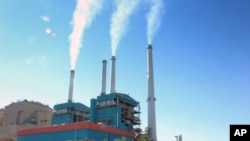WASHINGTON —
An environmental case now before the U.S. Supreme Court could have constitutional implications for the powers of the presidency.
The nine-member Supreme Court appeared divided Monday during oral arguments in a case related to the power of the federal government to limit greenhouse gas emissions blamed for global warming.
At issue is whether the executive branch, through the Environmental Protection Agency, is overstepping its bounds by expanding regulation of greenhouse gas emissions to include not just vehicles, but stationary sources such as power plants and factories.
Shannon Goessling is with the Southeastern Legal Foundation, which represents business groups and Republican lawmakers who oppose the Obama administration’s efforts to broaden the regulations.
“But what about down the road when you have an executive branch that abuses its authority? And that is what we really need to get into check in the whole area of checks and balances," she said. "We need to get restraint and the judiciary and the United States Supreme Court is the last place for that."
The Supreme Court case comes at a time when President Obama has repeatedly said that he will act on his own, rather than try to push legislation through Congress only to have it blocked by Republicans.
“I am eager to work with Congress whenever I can find opportunities to expand opportunities for more families," he said. "But wherever I can act on my own without Congress, by using my pen to take executive actions or picking up the phone and rallying folks around a common cause, that is what I am going to do."
Environmental groups and many Democrats support the EPA’s efforts to target global warming. American University Law School Professor Bill Snape, who is with the Center for Biological Diversity, attended Monday’s oral arguments.
“I think actually more is at stake politically because the perception that the president is somehow overstepping his bounds, and I think the far-right has been very upset about that, was a subscript in this case today," said Snape.
Snape says a number of environmental groups are closely watching the case before the Supreme Court, both for its political and policy implications.
“I do not think that EPA’s authority to regulate greenhouse gases is at issue," he said. "I think the issue is how and if they can issue particular permits to particular industries. That is very much at issue, and we will just have to wait, probably until June, to find out the answer."
Some of the liberal justices on the high court appeared comfortable with EPA’s regulatory approach during Monday’s session, while some of the conservative justices appeared more skeptical.
A Supreme Court ruling in the case is expected by the end of June.
The nine-member Supreme Court appeared divided Monday during oral arguments in a case related to the power of the federal government to limit greenhouse gas emissions blamed for global warming.
At issue is whether the executive branch, through the Environmental Protection Agency, is overstepping its bounds by expanding regulation of greenhouse gas emissions to include not just vehicles, but stationary sources such as power plants and factories.
Shannon Goessling is with the Southeastern Legal Foundation, which represents business groups and Republican lawmakers who oppose the Obama administration’s efforts to broaden the regulations.
“But what about down the road when you have an executive branch that abuses its authority? And that is what we really need to get into check in the whole area of checks and balances," she said. "We need to get restraint and the judiciary and the United States Supreme Court is the last place for that."
The Supreme Court case comes at a time when President Obama has repeatedly said that he will act on his own, rather than try to push legislation through Congress only to have it blocked by Republicans.
“I am eager to work with Congress whenever I can find opportunities to expand opportunities for more families," he said. "But wherever I can act on my own without Congress, by using my pen to take executive actions or picking up the phone and rallying folks around a common cause, that is what I am going to do."
Environmental groups and many Democrats support the EPA’s efforts to target global warming. American University Law School Professor Bill Snape, who is with the Center for Biological Diversity, attended Monday’s oral arguments.
“I think actually more is at stake politically because the perception that the president is somehow overstepping his bounds, and I think the far-right has been very upset about that, was a subscript in this case today," said Snape.
Snape says a number of environmental groups are closely watching the case before the Supreme Court, both for its political and policy implications.
“I do not think that EPA’s authority to regulate greenhouse gases is at issue," he said. "I think the issue is how and if they can issue particular permits to particular industries. That is very much at issue, and we will just have to wait, probably until June, to find out the answer."
Some of the liberal justices on the high court appeared comfortable with EPA’s regulatory approach during Monday’s session, while some of the conservative justices appeared more skeptical.
A Supreme Court ruling in the case is expected by the end of June.









